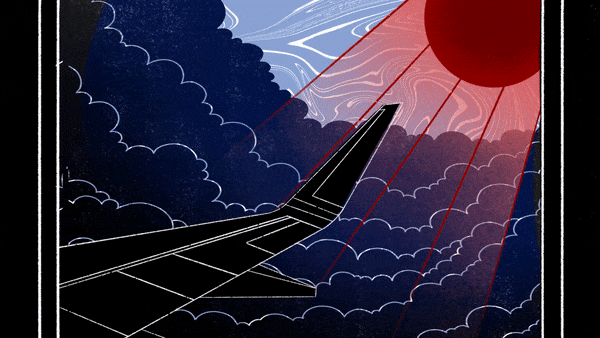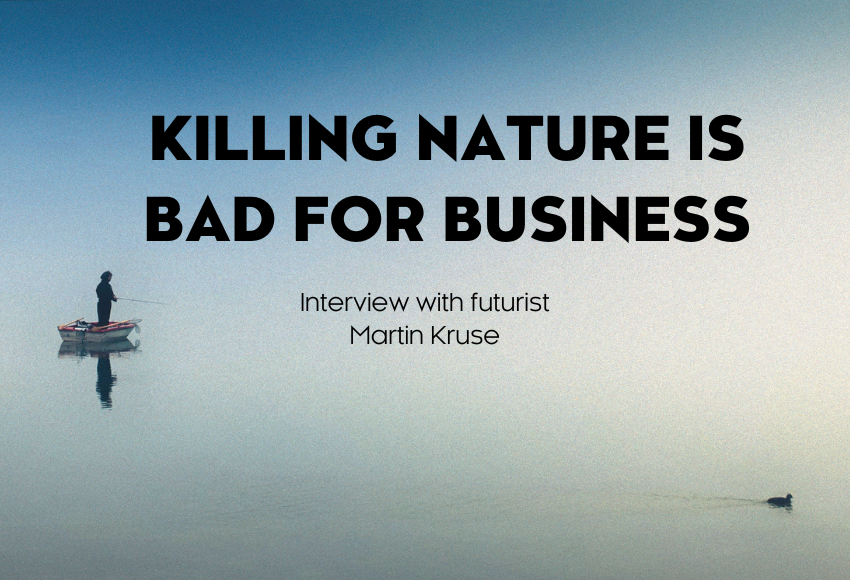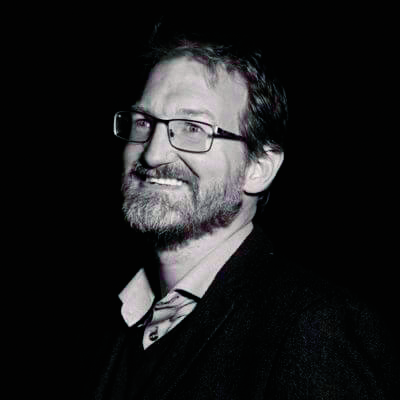
In turn, we use cookies to measure and obtain statistical data about the navigation of the users. You can configure and accept the use of the cookies, and modify your consent options, at any time.

Martin Kruse heads research on environmental and resource related issues at the Copenhagen Institute for Futures Studies. Throughout his career as a futurist, he has worked extensively with challenges relating to sustainability, food and water, energy, and the climate. Lately, Martin has devoted parts of his research to studying what happens to the global economy and food systems when the resilience of nature’s ecosystems falters through land degradation, extreme weather, biodiversity loss, overfishing and other exploitative practices. He shares his perspectives in this interview.
You believe that safeguarding ecosystems is not just a moral imperative. In many ways, it is an economic one as well. Can you explain what you mean by this?
Our economy is completely dependent on nature’s ecosystems to function and grow. In fact, the WEF estimates that most economic value generation – over 50% of the global GDP – is moderately or highly dependent on the health of natural ecosystems. The trouble is that this dependence is not priced in risk-wise or embedded in our economies via regulation. This makes us vulnerable on a systemic level if we continue our exploitative practices and don’t treat the continued health of the planet’s ecosystems as an economic necessity. It is, simply put, necessary for the long-term functioning of our economies and societies.
To give an example of what I mean, a recent report commissioned by the European Union found that the economic costs of deforestation are equal to about 7% of global GDP. This may seem counterintuitive. After all, chopping down trees, although bad for nature, is surely good for business, right? Well, only in the short term. Forests have economic value beyond the timber that is extracted from them. They filter pollution, absorb carbon dioxide, and prevent soil erosion by anchoring down nutrient-rich soil. These are the kinds of benefits that, though concrete and definable, are too rarely considered in our cost-benefit analyses. This makes us vulnerable on a systemic level, and change is clearly needed.
We must assume this has always been the case. Why are we only waking up to this fact now?
Until recently, I think most people have been used to seeing nature as an inexhaustible resource. I recently travelled to Norway on vacation and while I was there, I spoke to an elderly man who had been fishing in the local fjords his entire life. In his youth, he said, there were times when you could simply roll up your sleeves, stick your hand into the water, and grab the fish with your fist. This is the reality he grew up in, and like most others at the time, he believed that this was the way his world would always be. Nature was seen as immense and bountiful, and in comparison, we humans were small and unable to change it in any significant way.
That has all changed. The world this man now inhabits is one that is radically different from what he experienced when he was young. The fish in his fjords are much smaller today, there are fewer of them, and they are plagued by various diseases.
This anecdote is echoed on a global scale. The plight of insect populations is just one of the many troubling indicators of the direction we are currently heading; if the existing rate of decline continues, it is estimated that all insect species will be extinct in around 100 years. If bees and other insects die out, our crops will fail, and our global food systems will collapse – with all the negative consequences that come with it. Even before we get to that point, the upsets to global food production and supply stemming from environmental degradation will have had major consequences.
What kind of consequences?
Most likely ones that involve chaos and unrest. History can be a guide to helps us understand the dynamics at play. Let’s take the French Revolution as an example. To say this was a world-changing event would be an understatement. But of course, it did not come about on its own. In fact, it is questionable whether the revolution would have happened at all if France had not gone through years of poor harvests and widespread famine. The cause of the crop failure was a volcanic eruption in Iceland which had wide-ranging impacts to Europe’s agriculture and economies. So effectively, a natural phenomenon – a volcanic eruption – and the subsequent upset to the food supply, contributed to a series of events that would go on to change the course of world history in a major way. It shows how dependent our systems and societies are on the natural environment remaining somewhat stable.
History is also rife with instances of environmental exploitation contributing to civilisational decline. We see many of the risks associated with unsustainable practices and overexploitation of ecosystems, and yet we carry on because we don’t have the necessary incentive structures in place to change our behaviour. The lack of a global carbon tax is making this especially evident.
The key risk lies in the fact that we have to do with certain types of systems with threshold levels – often unknown to us – the passing of which can set in motion a snowball effect. The Amazon is thought to be such a system where reaching
a certain level of deforestation marks a tipping point that will change the micro-climate and turn the rainforest to Savannah.
What about our proven capacity to show restraint – and to live in a way that is in harmony with nature. Can we find inspiration or hope in this?
We can, and we often point to indigenous cultures as proof of this. We have plenty of examples of humans practicing extraction and harvesting nature’s resources in a way that allows these resources to regenerate. In these cases, nature is seen as bountiful but treated with respect to avoid destruction and collapse. That is the ideal, and while there’s certainly inspiration to find, even indigenous peoples have overexploited nature’s resources and hunted animal species to extinction – like what happened to the megafauna at the end of the last ice age. We, Homo Sapiens, may even have played a large part in the extermination of other species of humans like the Neanderthals in Europe.
We have – and have always had – a tendency to overexploit. We have that vice in us. The issue today, compared to the past, is the global interdependence of our societies, supply chains, and economies, coupled with the fact that we don’t have systems in place that limit us. This is the market failure of inadequate pricing of externalities.
And the scale and interconnectedness of global civilisation means that the risks then become that much greater?
Yes. Taking the worst-case scenario – societal collapse – we can no longer imagine it being a local phenomenon. Global interconnectivity makes us more resilient because a failure in one part of the system can be made up for by other parts. But it also means that a general breakdown, if it comes, would be that much more destructive. When we consider that our economy is completely dependent on natural ecosystems to function and grow – and that we are slowly eroding that foundation – the risk becomes obvious.
It’s easy to become pessimistic. Where do you see solutions or cause for hope? I think the more we learn about the interdependence of ecosystems, the more we are also able to effect positive change.
A favourite example of mine is from Yellowstone National Park in the US, where wolves were reintroduced as part of a conservation effort. Somewhat counterintuitively, increasing the number of wolves had the effect of also boosting the number of deer in the park as well as causing a revitalisation of other plant and animal life.
One of the things the conservationists learned was that the wolves would eat the sick deer first, minimising the risk of disease outbreaks in the herd, thus leading to a stronger, more plentiful deer population. Another by-product was a change in behaviour in the deer, who would stay away from open grasslands where the wolves roamed. This meant that the trees and vegetation that the deer would keep down by consuming it, could now grow more freely, which in turn had the effect of changing the landscape and attracting more wildlife. So, in the end, the simple act of releasing more wolves into the park – moving the predator-prey relationship closer to what it had been in the past – set in motion a domino effect that led to much healthier ecosystems and a gradual rewilding of some parts of the park.
Similarly in Canada, researchers have learned more about how the salmon that are hunted and killed by bears in rivers are, quite surprisingly, important to the ecosystems of the forests as well. This is explained by the fact that the bears are mostly interested in the parts of the salmon that are rich in protein, like the brain, and they throw away the rest on land where these food scraps provide valuable nutrients to the soil. In this way, the river and the forest are not separate, but interdependent ecosystems.
Nature, as a whole, is made up of these complex and entangled systems, and we are only now starting to understand their dynamics on a deep level. The more we learn, the more we realise how little we know, and this realisation could help us apply a precautionary principle in our approach to nature, so we can minimise the risk of reaching ‘tipping points’ where the damage we do is beyond repair.

Martin Kruse is a futurist and Senior Advisor at the Copenhagen Institute for Futures Studies. He is Chair of the Copenhagen Node of The Millennium Project, a global futures research think tank, and has staffed the G20 expert panel, providing recommendations on green growth. He is the lead author behind a newly published report on Danes and the climate, which was widely reported on in Danish media.